Flash Floods Kill Several, Inflict Damage In Over A Dozen Iranian Provinces
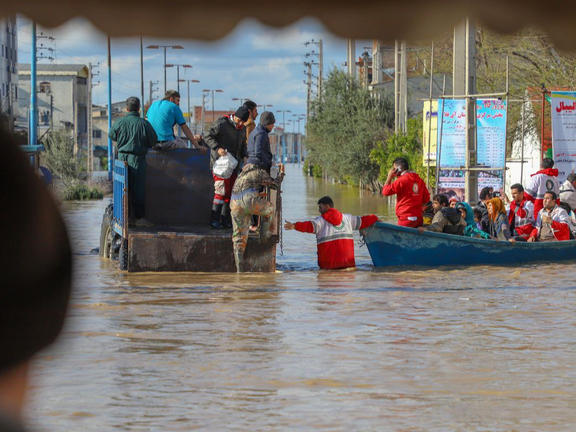
Iran has experienced severe weather over the past few days, causing fatalities, flooding, and damage to livestock and infrastructure.

Iran has experienced severe weather over the past few days, causing fatalities, flooding, and damage to livestock and infrastructure.
According to the country’s Red Crescent Society 13 provinces were affected by the floods including Esfahan, Tehran, Semnan, Zanjan, Qazvin, and East Azerbaijan.
During the deluge in Ardestan, Esfahan Province, at least four people lost their lives, nine others were injured and two went missing. A total of 15 houses were destroyed.
In the city of Ahar, located in East Azerbaijan Province, heavy rain and flash floods resulted in one death and two injuries while the floods in Shahrud in Semnan Province inflicted severe damage to homes and other infrastructure. Such heavy floods at this time of the year is rare in Iran.
Several rescue operations were underway in Firuzkuh county near Tehran by the Red Crescent. As reported by Tasnim news agency, homes were damaged, and livestock lost in the area.
Meanwhile, strong winds damaged houses and broke the trees in the capital Tehran which led to the injury of approximately 25 people.
Several livestock were killed due to flash flooding in Zarandieh county near Tehran, while a person died as lightning struck him in Arak, according to Tasnim news agency.
Floods also occurred in the country in late May this year, causing four deaths in Faruj and Shirvan counties in North Khorasan province.
The massive flood in Iran took the lives of 62 people last year and dozens of others went missing. Indian sub-continent summer monsoons usually bring rain showers to Iran’s arid plateau, but every few decades the impact becomes more intense and causes flooding.
Partly due to the arid nature of the land and partly because of neglect in urban planning, even a modestly strong storm leads to deadly floods in Iran.
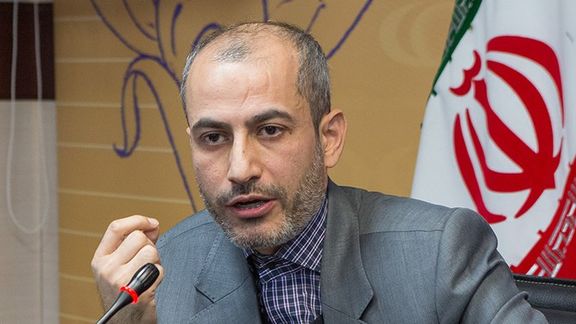
A conservative Iranian lawmaker has confirmed recent reports that Washington held direct talks with Tehran, although he said there will be no deal in the near future.
“Despite some negotiations in New York, there is no impending agreement soon because of US obstructions,” Mojataba Tavangar tweeted on Saturday.
Tavangar is a ‘principlist’ Iranian politician, which means he can be considered a hardliner, although on some issues he has exhibited flexibility in the past. Unlike many other hardliners dominating the parliament, Tavangar is a more educated politician having spent years as a researcher.
“America is trying to get more concessions from Iran in nuclear matters, in exchange for releasing frozen funds, a policy violating the law and in contradiction to Iran’s interests,” Tavangar added.
Iran International reported in January that US special envoy for Iran, Robert Malley had held three meetings with Iran’s UN ambassador Saeed Iravani in New York in the closing weeks of 2022. The State Department never denied this report, and said Washington had many channels to relay messages to Tehran.
The reports of more meetings resurfaced in June, when the Financial Times and others reported that meetings have taken place in New York and perhaps in Oman, which has long acted as a mediator between Tehran and Washington.
The State Department did not directly deny the latest reports either. Asked about the media reports, deputy spokesperson Vedant Patel said, “I don’t have anything to announce on this front.”
He added, “As you’ve heard me say previously, we have the means to communicate with Iran and deliver messages to them that are in America’s interest to do so. We’re not going to detail the contents of those messages or the means of those deliveries. I don’t have anything additional to add there.” He refused to comment further.
The Iranian lawmaker Tavangar in his tweet also claimed that the United States is pushing Iran toward direct talks, and even regarding American prisoners (hostages) in Iran is not negotiating seriously. He described media reports about secret talks and progress toward a deal as “media hype” saying that Washington’s goal is to highlight Iran’s economic problems and inflict “a shock” on the market.
Tavangar’s statements could well be an indirect message by the regime to its domestic audience, as the news about a possible deal has led to some premature hopes. The Iranian rial has risen against the US dollar in the past week, and any negative diplomatic news could push the battered currency toward a steep fall.
It is worth noting that many media outlets in Tehran, under tight government control, widely reported on Tavangar’s tweet.
Iran International also reported May 27, that talks on the release of Tehran’s frozen assets could result in a deal soon, based on a source with direct knowledge of the talks. Apparently, the talks were focused on funds held in Iraq and South Korea. The money in Iraqi banks could be as much as $10 billion or more by most recent estimates mentioned by Iranian officials. Iraq imports natural gas and electricity from Iran but is barred by US sanctions to make dollar transfers to Tehran.
The funds in South Korea could be exchanged for the release of three US dual nationals held hostage in Iran.
ILNA news website in Tehran reported Saturday that Secretary of State Antony Blinken discussed the issue of the funds blocked in Iraq with his Iraqi counterpart during his recent visit to Saudi Arabia. Apparently Baghdad is urging Washington to find a solution, the website said.
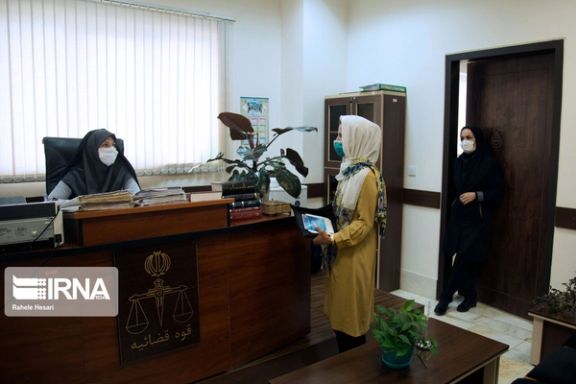
The head of the Research Center of Iran’s Parliament says there are 121 female judges in Iran, but they are not authorized to sign a verdict.
According to Babak Negahdari, women in the Islamic Republic can preside in family court and draft the verdict, but the final ruling has to be signed by a male judge.
After the 1979 revolution, in addition to the hijab, the Islamic republic forced all female employees of the court system out of their jobs.
Women were only given supportive roles and no leadership positions in the governmental institutions after the revolution.
“During the following years, parliamentarians made amendments to the law on the conditions for the selection of judges and passed the family protection bill, making it possible to attract and employ women as advisory judges in family courts, but they did not give women the right to sign verdicts,” added Negahdari.
There are no definitive figures on the number of women working anywhere in the Iranian judiciary today.
On the other hand, it was estimated that eight out of every 100 judges are women. In the past few years, fewer than 30 percent of participants in the judges' exams have been women, for what little roles remain available to them. Putting these scattered statistics together, it is evident that women have no place in the top echelons of Iran’s judiciary.
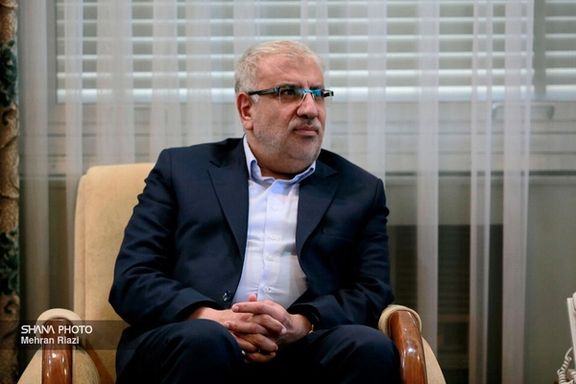
Iran has invested a total of $28.8 billion in its oil industry in past two years despite financial and technical strains, oil minister Javad Owji said Saturday.
Iran’s oil exports are under third-party sanctions by the United States and certain technologies are banned from being sold to Iran. Owji said these factors complicate much-needed investment in the country’s oil and gas industry.
Since assuming office in 2021, Owji has repeatedly said that the energy sector needs close to $250 billion in investments to stay productive and compete with other oil producers in the region. Saudi Arabia has invested hundreds of billion in the past 15 years.
However, various international sanctions have limited Iran’s financial resources, and Western sanctions on technology, some available only from large Western countries have left Iran’s oil and gas sector in an acute need for overhaul.
Lack of investments have led to natural gas shortages, while Iran has the second largest reserves in the world. This in turn reduces production at petrochemical and steel plants as well as deprives electricity generating plants of cleaner energy.
Owji claimed that $14.5 billion was invested in dozens of unfinished and new projects last year, and $14.3 billion is being invested this year.
Although Owji’s claims of large investments cannot be independently verified, and the government has a habit of exaggerating its meager accomplishments, he underlines that the oil industry is the most important economic sector and needs more attention than others.
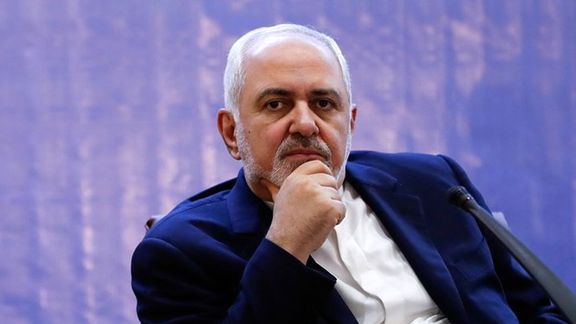
As attacks on Iran's former Foreign Minister Mohammad Javad Zarif continued following his latest policy statements, some media and politicians have defended him.
Zarif who was the main speaker at a five-hour long audio discussion on the social media app Club House earlier this week, defended his diplomatic approach of negotiations to reduce Western pressure on Iran.
The former foreign minister has long been a target of Iran’s hardliners as the supposed architect of the 2015 JCPOA nuclear deal and allegedly as a man inclined to forge better ties with the West. But in June these attacks intensified as Zarif began to tweet after a long silence.
The Raisi administration-owned daily Iran newspaper wrote Thursday that former Foreign Minister Zarif and former President Hassan Rouhani's foreign policy was nothing more than "begging the West for attention." The daily also charged that their policies were "marked by ignorance, confusion and naivety."
The daily added that Zarif and Rouhani's policies made the Iran's situation and its ties with other countries more complicated than ever. However, the newspaper did not specify its accusations with examples.
The daily wrote that their priority was redefining Iran's relations with the world, but their vision was limited to Europe and the United States. The statement was, of course, mindless of the fact that Iran's 25-year cooperation contract with China was signed under Rouhani with Zarif.
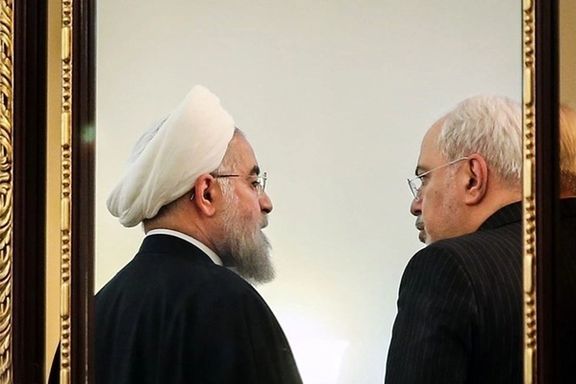
Iran daily also charged that Zarif's foreign policy was limited to furthering the talks over Iran's nuclear program. The daily further charged that Iran's ties with its neighbors were downgraded under President Rouhani.
In fact, it was Iran’s aggressive regional political and military policies and interventions in Syria and Yemen that soured it ties with Sunni Arab states. These policies were part of a grand strategy devised or at least approved by Supreme Leader Ali Khamenei, and not at the presidential level.
While under attack from the conservative camp Zarif said on Thursday that he has no plans whatsoever for the elections and added that he is not the kind of man who would run for the parliament, Zarif said that the controversy over his Clubhouse presence is rooted in the conservative's fear of his possible plans to run for President in 2025. He added that he has no plan to run for the post or to campaign for other politicians.
In the meantime, the editor of Jomhouri Eslami newspaper, Masih Mohajeri suggested that Zarif and his predecessor at the foreign ministry, Ali Akbar Salehi who later played a part in forging the 2015 JCPOA nuclear agreement, should take part in an open debate with the leading hardliners aligned with the current government who have been obstructing the nuclear talks for many years.
Mohajeri wrote that Iranians have a right to know what has happened to the talks and the nuclear program and such a debate can shed light on many ambiguities and show clearly who is right and who is lying about the other sides foreign, economic and domestic policies.
Also defending Zarif on Thursday was the centrist daily Ham Mihan, which attacked the Raisi administration and wrote that the current government portrays a disparaging image of its predecessor and characterizes its performance as "treasonous", while making a lot of fuss about its own meager achievements.
Ham Mihan wrote that the ruling politicians take advantage of the silence of the officials of the previous government and pass unilateral judgements about the Rouhani administration's track record without giving him and his aides a chance to freely respond to the accusations. Ham Miham further lashed out at the Raisi administration for lying about its "achievements" and not tolerating any criticism. The daily claimed that Raisi and his supporters hold more grudges against their political rivals than foreign enemies.
Foreign Policy expert Ghasem Mohebali defended Zarif by saying that what he said showed the difference between two approaches to national interests and the nuclear talks, adding that Zarif's approach was an example of efficiency while the new government's track record has all the signs of inefficiency.
Expediency Council member, moderate conservative politician Mohammad Sadr, on the other hand, defended Zarif and praised his performance regarding the nuclear deal, and attacked Raisi: "I have told Raisi that he is personally responsible for the economic problems resulting from the inconclusive situation of the nuclear talks under his government."
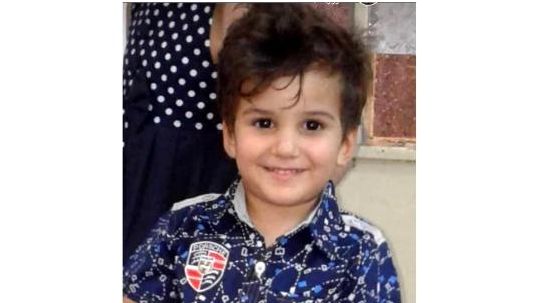
A nine-year-old Iranian boy has been killed after the police opened fire at his father's car in Iran's Khuzestan province on Friday.
Morteza Delf-Zargani’s father says the police started shooting at their car in the city of Shushtar without even a single warning and based on a false report of car theft.
According to the victim’s uncle, “when they saw the police car behind them, they intended to stop, but without any warning the police opened fire and Morteza died on the spot.”
The police claim they received reports about a car theft that fit the description of the family’s vehicle, and the officers ordered the suspect to pull over, but the driver did not pay attention to the warning and sped away.
In March, a two-year-old child was killed after Iranian special forces opened fire at the car carrying him and his family in the central city of Esfahan (Isfahan).
Morteza's case is also reminiscent of Kian Pirfalak, a 10-year-old boy who was killed by the Islamic Republic's security forces when they started shooting at his father's car during the 2022 protests.
Ironically, Morteza's death coincided with Kian's birthday anniversary.
Many innocent bystanders were killed by security forces during months of protests in 2022 and 2023. More than 500 people were shot or killed by security forces using deadly force.
Kian and his family were targeted by plainclothesmen during a night of protests in Izeh. Kian’s father was also paralyzed because of serious injuries he sustained during the attack. The government claimed “terrorists” had fired at the car, but Kian has become a public symbol of the regime’s brutality.